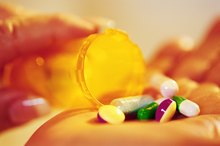What does fact checked mean?
At Healthfully, we strive to deliver objective content that is accurate and up-to-date. Our team periodically reviews articles in order to ensure content quality. The sources cited below consist of evidence from peer-reviewed journals, prominent medical organizations, academic associations, and government data.
The information contained on this site is for informational purposes only, and should not be used as a substitute for the advice of a professional health care provider. Please check with the appropriate physician regarding health questions and concerns. Although we strive to deliver accurate and up-to-date information, no guarantee to that effect is made.
Warfarin & Tea
Your doctor may prescribe the blood-thinning drug warfarin to prevent clotting in your veins or lungs or to keep existing clots in your veins from getting bigger. This drug can cause severe bleeding that can be life threatening, according to National Institutes of Health online medical encyclopedia Medline Plus. Consuming certain types of tea with warfarin raises your risk for bruising and excess bleeding. Other teas may interfere with warfarin. Consult your doctor before adding tea to your diet, and tell your doctor which teas you consume if your prescription is new.
Green Tea
Do not drink green tea along with warfarin because it contains vitamin K, which can make your medication ineffective, according to the University of Maryland Medical Center 1. Mixing green tea with other blood thinners, such as aspirin, also is risky because both prevent your platelets from clotting. This can raise your risk for bleeding.
Black and Oolong Tea
Herbs for Dissolving a Blood Clot
Learn More
Also avoid black tea and oolong tea. Both of these are derived from the same plant as green tea, Camellia sinensis, so carry the same risks as green tea when it comes to warfarin. The difference between these teas is in the way they are processed. Green tea is the unfermented version, oolong tea is semi-fermented and black tea is fully fermented.
- Also avoid black tea and oolong tea.
- Both of these are derived from the same plant as green tea, Camellia sinensis, so carry the same risks as green tea when it comes to warfarin.
Licorice
Some herbal teas also decrease warfarin’s effectiveness in your body. For example, licorice can increase the breakdown of warfarin in your body and decrease its effectiveness. This, in turn, raises your risk for clotting. Tell your doctor if you drink licorice tea and have your blood checked on a regular basis, recommend the experts at Medline Plus. Your doctor may need to alter your warfarin dosage.
- Some herbal teas also decrease warfarin’s effectiveness in your body.
Ginger and Other Herbal Teas
Cayenne Pepper and Warfarin
Learn More
Other herbal teas also affect warfarin in your body. Ginger tea, for example, may magnify warfarin’s effects, raising your risk for bleeding and bruising, according to “The Essential Herb-Drug-Vitamin Interaction Guide,” by George T. Grossberg and Barry Fox 2. Your blood clotting time, known as the international normalized ratio, or INR, is used to monitor warfarin’s effectiveness. Numerous herbal teas can cause your INR to be too high or too low, according to the Cleveland Clinic. Do not consume chamomile, sweet clover, sweet woodruff or tonka bean tea when you take warfarin because these affect your INR. Other herbs that are sometimes used in tea and affect INR include echinacea, fenugreek, ginseng, passion flower and red clover. Consult your doctor before trying any herbal tea.
- Other herbal teas also affect warfarin in your body.
- Ginger tea, for example, may magnify warfarin’s effects, raising your risk for bleeding and bruising, according to “The Essential Herb-Drug-Vitamin Interaction Guide,” by George T. Grossberg and Barry Fox 2.
Related Articles
References
- University of Maryland Medical Center; Green Tea; September 2010
- “The Essential Herb-Drug-Vitamin Interaction Guide”; George T. Grossberg and Barry Fox; 2007
- Cleveland Clinic; Anticoagulant Medication Warfarin; 2009
- Coumadin (warfarin sodium) [package insert]. Princeton, New Jersey: Bristol-Myers Squibb, 20XX.
- Harter K, Levine M, Henderson SO. Anticoagulation drug therapy: a review. West J Emerg Med. 2015;16(1):11-7. DOI: 10.5811/westjem.2014.12.22933
- Patel S, Patel N. Warfarin. In: StatPearls [Internet]. Treasure Island (FL): StatPearls Publishing.
- Tideman PA, Tirimacco R, St John A, Roberts GW. How to manage warfarin therapy. Aust Prescr. 2015;38(2):44-8. DOI: 10.18773/austprescr.2015.016
Writer Bio
Linda Tarr Kent is a reporter and editor with more than 20 years experience at Gannett Company Inc., The McClatchy Company, Sound Publishing Inc., Mach Publishing, MomFit The Movement and other companies. Her area of expertise is health and fitness. She is a Bosu fitness and stand-up paddle surfing instructor. Kent holds a bachelor's degree in journalism from Washington State University.









